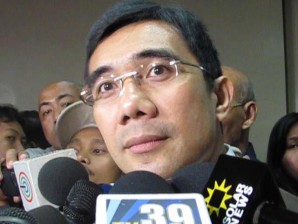Deal with it, Supreme Court tells lawmakers on JBC
The ball is now in the lawmakers’ court.
Standing pat on its decision to cut congressional representation from two to only one in the Judicial and Bar Council (JBC), the Supreme Court (SC) said only a constitutional amendment would allow lawmakers to retain their current two votes in the body that screens nominees to the Supreme Court and other courts, including for the post of Chief Justice.
Representative Niel Tupas Jr., one of the two legislative representatives in the JBC, said Congress would file a motion to reconsider the ruling. He also accused the justices of operating like a “secret society” and maneuvering to give “their insiders the advantage” in the JBC selection of the next Chief Justice.
Senator Francis Escudero, the other congressional member of the JBC, expressed concern that since the JBC had operated with two representatives from Congress since 2002, all JBC decisions on nominations for various judicial posts may have to be reviewed.
Tupas and Escudero head the justice committees of their respective chambers.
Article continues after this advertisementBut the high court, releasing the contents of its July 17 resolution to media on Friday, said that while it “finds wisdom” in the argument of the two lawmakers that both chambers of Congress should be represented in the body, it did not have the “power to correct” the Constitution.
Article continues after this advertisementOnly Congress can act
“Needless to state, the remedy lies in the amendment of a constitutional provision,” the court said in its resolution.
The court was referring to Section 8, Article VIII, of the 1987 Constitution which states: “A Judicial and Bar Council is hereby created under the supervision of the Supreme Court composed of the Chief Justice as ex-officio chair, the Secretary of Justice, and a representative of the Congress as ex-officio members, a representative of the Integrated Bar, a professor of law, a retired member of the Supreme Court and a representative of the private sector.”
Only Congress, acting as a constituent assembly or calling for a constitutional convention, can amend the Constitution.
Voting 7-2, the tribunal affirmed the opinion of former Solicitor General Francisco Chavez that the presence of both Escudero and Tupas in the JBC violated the constitutional provision on the membership of the body.
Motion to be filed
Tupas said Congress would file its motion for reconsideration in the Office of the Solicitor General either today or Tuesday. He said the interviews (of 22 candidates) would start immediately after the State of the Nation Address of the President and the voting would be held on July 30.
“As long as there is a motion for reconsideration, there is a status quo, Chiz (Escudero’s nickname) and I will sit down in the interviews,” said Tupas.
Tupas, who led the House prosecution panel in the recent impeachment trial of Chief Justice Renato Corona, accused the Supreme Court justices of operating like a “secret society” and of wanting to give candidates from their own ranks the advantage in the selection of the next Chief Justice.
Protecting somebody
“They are protecting somebody with their decision because it would favor the insiders. The JBC is under the supervision of the SC. The presiding officer is an SC member. If the votes of Congress are curtailed, in a way, it favors the SC. I can feel the maneuverings there (JBC), because the only people they can’t control are the senator and congressman. We are there as part of the check and balance. The others, they are under the judiciary. Only the secretary of justice is not beholden to the SC,” said Tupas in a radio interview.
But he admitted: “We can’t remedy this because, as they said in their decision, the Constitution would have to be amended.”
Tupas pointed out that six incumbent justices, including Associate Justice Antonio Carpio, were among the 22 candidates and all of them asked not to have to go through an interview. “But we didn’t allow that,” he said.
Tupas said the JBC members had an option to reveal during the interviews the bank records and statement of assets, liabilities and net worth (SALN) of the candidates who waived the confidentiality of these documents.
Escudero’s four options
At any rate, Escudero said Congress could consider four options to adjust to the situation:
One is that he and Tupas take turns sitting in JBC meetings and deliberations. Another is for the two of them to thresh out a time-sharing agreement similar to what Senator Joker Arroyo had with Senator Francis Pangilinan when they were both the JBC representatives.
A third is for the House and the Senate to be allowed a “half-vote” each in JBC deliberations. Yet another is for Congress to choose between him and Tupas. But Escudero admitted in a radio interview that this last option would be the most difficult and would require “intense coordination” between the two chambers. With a report from Cathy Yamsuan
